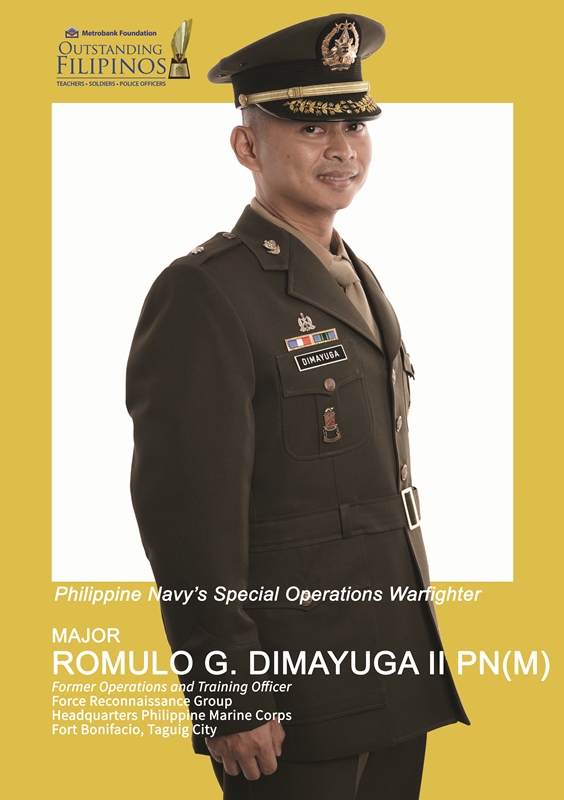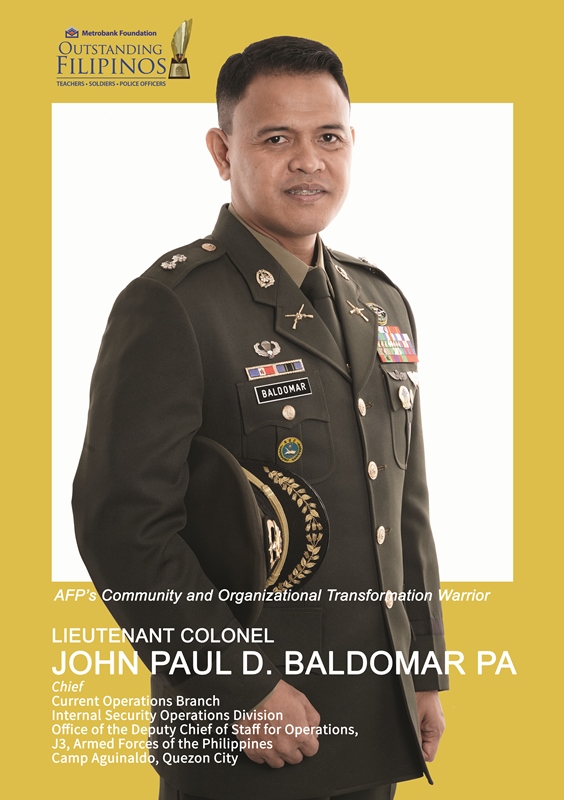
Profiles of the 2019 MBFI Outstanding Filipino Soldiers

“I want to be an instrument of peace. I want to use my technical expertise to protect and save the lives of the innocent, and to give glory to my God, my family and my country…My source of fulfilment as a soldier is when I can render safe or defuse a bomb without any harm, accomplish my mission to serve the people and secure the land, and go home to my family safe and sound.”
When a person encounters a suspected explosive material, the instinctive response is fear and the standard protocol is to keep a distance; rarely is it to move towards potential danger. This is the risk that MSgt. Ramil A. Caporas PA is all too familiar with. A two-decade career in ordnance service means that his definition of all in a day’s work involves putting himself in perilous situations to protect his comrades and the nation.
He has made it his life’s work to safeguard communities from bomb threats, even if it means constantly facing the reality that his profession entails a slim margin of error.
His contributions to the country’s military forces reflect his character as a soldier and leader: bravado combined with ingenuity and faith. These are what he carries whenever he goes out on a mission. These were also what he carried when he was one of the first few assigned in Marawi during the siege.
MSgt. Caporas led a team of explosive ordnance disposal (EOD) experts tasked to recover and dispose Improvised Explosive Devices (IEDs) and Unexploded Ordnances (UXOs) during the five-month battle. Their expertise resulted in the recovery and proper disposal of over 1,000 IEDs, ensuring the safety of the troops inside the war zone.
MSgt. Caporas was deployed in Marawi for the whole duration of the combat. In one high-risk operation, he was able to use raw materials available in the area to create an explosive, called “Bintana”, instrumental to the assaulting troops. This frame-like contraption was used to breach walls of buildings, which served as staging points of attack for government forces while under hostile enemy fire.
Carrying “Bintana” during operations added another layer of difficulty to maneuver but MSgt. Caporas pressed on resolutely, armed with the knowledge that it will help defend the lives of his men and the civilians. This pragmatic innovation for a complex situation played a significant role in weakening the opposing parties’ forces and the liberation of Marawi.
Further, MSgt. Caporas led a team that investigated a car bomb explosion in Lamitan City, Basilan, which was considered a new tactic in the Philippines’ IED landscape. The lecture he conducted to the troops in the area on counter IED promoted vigilance that prevented the rigged vehicle from proceeding to the target site—a school celebrating Nutrition Month. This incident was staged by a member of a terrorist group. MSgt. Caporas’ team’s intervention was key in thwarting what could have been a massive incident involving many casualties.
The subject of bombs may be considered taboo, MSgt. Caporas nonetheless believes that upholding safety and security across the lands cannot be done singlehandedly; it is a shared responsibility of the armed forces and civilians, especially since the latter is the usual target. Thus, he aims to educate and equip citizens with the right knowledge to handle threats involving bombs and other explosive devices.
He conducted several IED Recognition and Safety Awareness training’s and Bomb Threat Management seminars to the general public in Cebu, Negros Island, Panay Group of Islands, Lanao del Norte, Lanao del Sur, Zamboanga Peninsula and Basilan from 2012 to 2018. These seminars combine lecture to promote theoretical understanding as well as simulation of possible explosives threat to help paint a clearer picture among the participants.
Given the subject matter’s technical nature, MSgt. Caporas crafted a program of instruction tailor fit to laypersons. These seminars cater to a range of audiences, from government organization and private sectors to academe and religious sectors. He hopes that these efforts will reduce the risk of attacks in private and public spaces.
Moreover, he renders his services as a commentator of a Sunday radio program entitled “Ang Inyo Army sa Negros”, to propagate information and communicate the peace-building initiatives of the army in the hinterlands of Negros Island.
MSgt. Caporas, 41, earned his Master’s degree in Public Administration at Carlos Hilado Memorial State College in Bacolod City, Negros Occidental. He is married, and is a father of four.

“My early years as a Force Recon Marine were marked with literal blood, sweat and tears. I have experienced being wounded, being outnumbered in a firefight, losing comrades, being away from my loved ones, among others. These seem to be enough reasons for a sane man to quit this perilous job and find a safer one, but not for me. I’ve always known that the moment I signed up for the Philippine Marine Corps, all those came inside my canteen cup for free and with unlimited refill.”
The life of a soldier is marked by the constant shadow of danger, and fuelled by the rallying cry of putting others’ welfare before one’s own—all in service of the people and the country. That in itself is a daunting prospect. This, however, did not deter Maj. Romulo G. Dimayuga II, who grew up harboring the dream of following in his father’s footsteps. He knew the risks of being on the frontlines yet he kept being driven onward.
Nineteen (19) years into the military service, Maj. Dimayuga has held a number of key positions as a Marine officer and has rendered game-changing contributions to the military.
In 2006, his leadership as a platoon commander of a Force Recon Platoon was key to crippling the forces of the most notorious terrorist group in the country by infiltrating their stronghold in Sulu. This led to the neutralization of its top leader who was tagged as one of the most wanted men in Southeast Asia and was listed as one of FBI’s most wanted terrorists. This news made headlines. Maj. Dimayuga and his platoon suffered losses and incurred injuries during this campaign, but they continue to remember this as a victory for the country against terrorism.
Further, Maj. Dimayuga’s stints as Intelligence Officer of Marine Battalion Landing Team-4 and Operations Officer of Marine Battalion Landing Team-12 from 2013 to 2014 and 2017 to 2018, respectively, marked his crucial role in the successful counter-communist insurgency operations against the Communist Party of the Philippines-New People’s Army-National Democratic Front (CPP-NPA-NDF) in Northern Palawan.
The province has had a long history of being plagued by communist insurgency activities. This was the situation Maj. Dimayuga and his troops aimed to transform. For them, restoring peace not only meant defeating the enemies, but, primarily, creating an environment where communities can thrive.
To achieve this, Maj. Dimayuga’s unit used an innovative yet pragmatic approach rooted in promoting a productive and lasting relationship with the locals. They knocked on every resident’s door to learn about their needs and at the same time to send the message across that they can be their allies. These efforts have contributed to the declaration of Palawan province as a “Zone of Sustained Peace, Development, and Prosperity” in 2014.
Moreover, Maj. Dimayuga channeled his efforts into forging a partnership between his units and the locals of northern Palawan and Puerto Princesa City by underscoring their mutual aspiration: weakening the communist insurgents’ ranks and curbing the threat among Palaweños.
Maj. Dimayuga spearheaded this initiative by employing a different tactic. He knew that urging the insurgents to walk away from the armed struggle cannot be achieved solely by force and combat operations, but by offering them another chance to re-integrate to mainstream society and bring back normalcy in their lives. Further, his unit ensured that the residents, especially the youth, are properly informed so they will not be influenced.
Inside his institution, Maj. Dimayuga led the standardization of training programs that aims to improve the combat effectiveness of the Force Reconnaissance Group, Philippine Marine Corps’ elite unit, and the Marine Battalion Landing Team-12’s Scout Sniper Squad. As a veteran of combat, he identified the gaps and incorporated his own experiences in crafting training programs attuned to real-life situations.
Defending the country’s sovereignty is also a part of his duty. From 2017 to 2018, he was the Operations Officer of Marine Battalion Landing Team-12 in charge of conducting territorial defense in the Kalayaan Island Group (KIG), West Philippine Sea. His battalion provided round-the-clock security of seven (7) out of nine (9) islands— Lawak, Patag, Likas, Pag-asa, Panata, Parola, and Patag—of KIG and the whole northern Palawan.
Over the course of his storied career, Maj. Dimayuga’s inspiration is to make a difference wherever his mission takes him. His assignments might have entailed blood, sweat, and tears but Maj. Dimayuga pledges to always live by the Marine’s code of honor, duty, and valor to defend his country. Maj. Dimayuga, 37, is a graduate of PMA Class of 2005 and is married. He has been part of the country’s forces for 19 years now.
At present, he is taking up Master of Science in Defense Analysis (Irregular Warfare) at the Naval Postgraduate School in Monterey, California, USA.

“I believe this is my purpose: to serve others and fight for those who cannot defend themselves. Every time I go out to do my job, I always think that I am doing this so that my family and the Filipino people would peacefully sleep while I and the entire Armed Forces of the Philippines are standing on the line fighting for their safety. Moreover, I want to ensure that the generations to come, the children of my children, would enjoy the same freedom I have enjoyed. I always consider it as a sense of fulfilment seeing the Philippine Flag freely hoisted which signifies our independence and freedom.”
When one thinks of the country’s uniformed men and women, it is easy to picture them on the frontlines, gallantly orchestrating high-risk missions and advancing under enemy fire. Rarely is it considered that behind their hardened exterior lies the real drive of a soldier: a heart that puts the nation and its people first.
This is the sentiment that encapsulates Lt. Col. John Paul D. Baldomar’s 22 years of service in the Philippine Army. His heart for the people is best reflected in the initiative he spearheaded back in 2001 when he was assigned with Bravo Company, 37th Infantry Battalion, 6th Infantry Division, Philippine Army and subsequently became its Company Commander. In this capacity, he rallied his troop in responding to the plight of the 95 internally displaced Tiruray families at Sitio Kyamko (Hill 224), Barangay Maitumaig, Datu Unsay, Maguindanao.
The Tiruray community originally resided in Peris Hill, Maguindanao. The difficulty of thriving in a strife-torn environment due to armed lawless groups’ activities resulted in the community’s dispersal. Uprooted from their ancestral land, a majority of them took up residence in North and South Upi, Maguindanao, while a segment sought refuge in a patrol base of Bravo Company, 37IB located at Hill 224, a military outpost over three kilometers away from the national highway that is only accessible by foot.
Years later, this is the scene that Lt. Col. Baldomar witnessed: a community living in temporary shelters, facing imminent threat and barely meeting their basic social needs. He was then moved to action, initiating projects that will support the Tiruray in establishing a new home and becoming a self-sufficient community.
His unit’s relationship with the community was founded on mutual trust. The former collaborated with the local government and non-government organizations to implement community-based programs, and support the development of infrastructures such as school buildings, farm-to-market roads, multipurpose hall, and a place of worship.
The Tiruray’s story of recovery can be traced back to the compassionate efforts of Lt. Col. Baldomar and his troops who went beyond their mandate. The community grew from 95 displaced families in 2001 to more or less 300 empowered and self-sufficient families in 2019. With their growing number, the original Sitio Kyamko expanded to two other communities in Sitio Bagong and Sitio Peris.
Years later, translating this experience into his work served as his fuel to serve and be a part of the transformation journey of the Armed Forces of the Philippines (AFP). Lt. Col. Baldomar was designated as Chief of the Strategic Communications Branch under the AFP’s Office for Strategic Studies and Strategy Management in 2014. Together with the team, he steered the development and implementation of the AFP Transformation Roadmap strategic communication plan called “Horizon 1”.
Horizon 1 stresses the significance of constantly aligning the AFP’s actions to its vision—“A World-Class Armed Forces, Source of National Pride”—in instilling a culture of genuine transformation and good governance. Upon publication of the strategic communication plan, Lt. Col. Baldomar’s team developed the design, facilitated the promulgation, and spearheaded the execution of activities that aims to enhance AFP’s capacity building and professionalism of its ranks.
Lt. Col. Baldomar’s impact was also stamped when he heeded the call to help shape the next breed of leaders of the AFP and the Philippine National Police (PNP) through the “Transforming Leaders Initiative”. He joined hands with volunteer military officers in carrying out seminars for Tactical officers, as well as training staff and cadets of the Philippine Military Academy (PMA) and the Philippine National Police Academy. What began as a series of three (3) seminars has been recognized as a best practice and is rolled out in both academies. Further, it was adopted by the International Graduate School of Leadership to be incorporated as part of their leadership program.
Lt. Col. Baldomar, 41, is currently designated as the Chief, Current Operations Branch, Internal Security Operations Division, Office of the Deputy Chief of Staff for Operations, J3, Armed Forces of the Philippines (AFP). He is a graduate of PMA Class of 2001. He earned his Master’s degree in Transformational Leadership at the International Graduate School of Leadership-Asia in 2014. He is married and has two kids.





